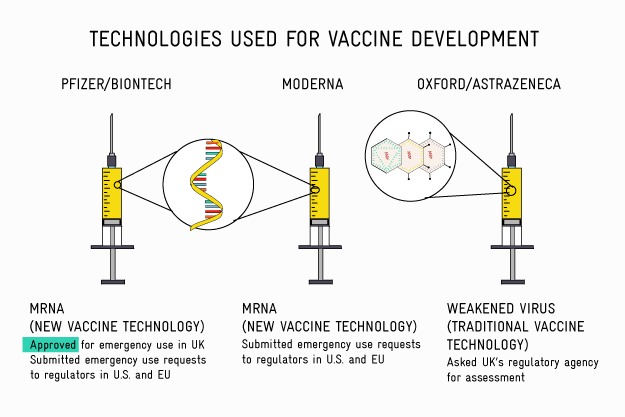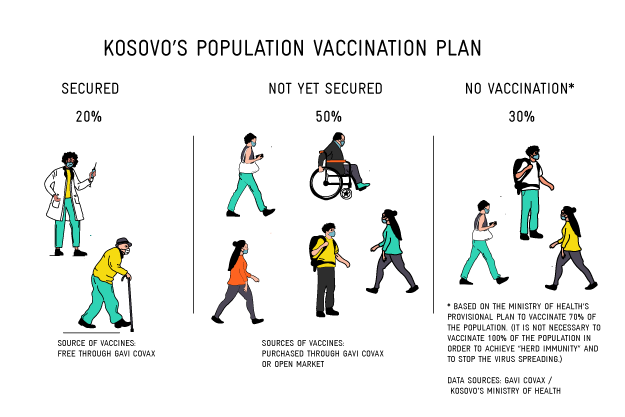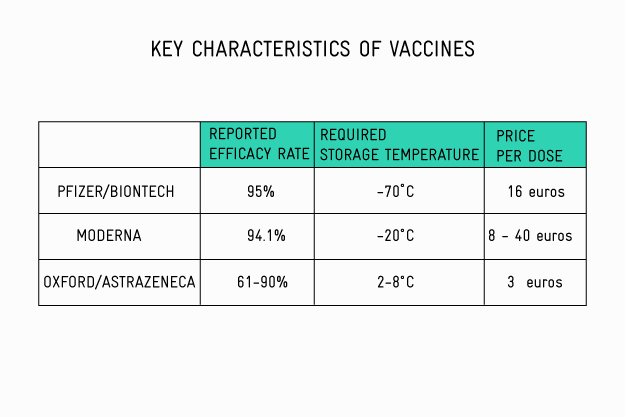This article was published in December 2020 and may contain information that is now out of date. For our latest articles on the COVID-19 pandemic, please visit
our COVID-19 page.
On December 2, the UK became the first Western country to approve a COVID-19 vaccine. The British medicines regulator, the MHRA, confirmed that the Pfizer/BioNTech vaccine is safe and effective — offering around 95% protection against COVID-19.
The UK’s immunization program began on Tuesday (December 8) with people aged over 80 and frontline medical staff in some health and social care facilities amongst the first people to receive the vaccine.
Approval from state authorities to begin using vaccines requires several clinical trials where the effectiveness and safety of the vaccine is tested in different phases, as well as a vigorous verification process. The process typically takes years, often as long as 10 years, but scientists have managed to reach the approval phase for a COVID-19 vaccine within a year — and it is hoped several other vaccines for COVID-19 will also soon be approved.
After the approval comes the delivery process, which presents another challenge altogether. Vaccines have to be stored and maintained in strict conditions until they are delivered to the final user, staff must be trained to safely handle and administer the vaccine, and priorities for recipients have to be established — all of which requires meticulous logistical planning.
We consulted experts and talked to the relevant authorities in Kosovo to better understand the information around COVID-19 vaccines, and when vaccines may be delivered in Kosovo.
What are vaccines?
The development of vaccines is considered to be one of the greatest public health achievements, saving millions of lives every year by preventing serious diseases — such as diphtheria, tetanus, influenza and measles — that in the past caused deaths on a large scale. The World Health Organization (WHO) estimates that 2-3 million deaths are prevented each year as a result of immunization.
Most vaccines contain a weakened or neutralized component of the disease-causing pathogen — known as antigens. These antigens stimulate the natural immune system by activating antibodies. This means that if they encounter the virus in the future, they are already prepared to fight it off.
Newer generations of vaccines — known as mRNA — contain only a genetic blueprint that instructs the body to produce the antigens itself, rather than injecting antigens directly. However, neither of these components causes harm to the person vaccinated.
Which COVID-19 vaccines are approaching approval?
Three vaccines are currently approaching approval from regulatory authorities. Two of the most promising ones are the Pfizer/BioNTech vaccine — which has already received approval in the UK — and the vaccine developed by U.S-based drugmaker Moderna. Both use mRNA technology.
Both companies have filed applications for emergency approval to several regulatory authorities in the U.S. and Europe, and according to the results of clinical trials revealed by these companies, both vaccines have efficiency rates of around 95%.
The third vaccine believed to be highly effective is the one developed by AstraZeneca and Oxford University; this uses a weakened virus strain to stimulate the immune response and has shown efficacy results between 62 and 90%, depending on the dose regimen. Based on preliminary data, the vaccine is more effective when it is given half dose followed by full dose, rather than two full doses.

Image: Arrita Katona / K2.0.
The Oxford/Astrazeneca vaccine is produced on a not-for-profit basis and is therefore the cheapest at around 3 pounds (3.20 euros) per dose — five times cheaper than the Pfizer/BioNTech vaccine, which itself is expected to be cheaper than the Moderna vaccine. It also has some important logistical advantages, but it is still undergoing checks by regulators and has not yet been approved for use.
Kreshnik Hoxha, who has a PhD in crystal engineering and works in the UK as a scientific manager for developing new drugs, explains that the efficacy rates of all three vaccines are above the criteria required for vaccine approval.
“Statements of results by the scientific groups themselves show that the vaccines have a high efficacy — in fact much higher than the 50% efficacy criterion mentioned by the U.S. regulatory authority, the FDA,” he says.
Regarding the safety data, Hoxha says that from the trial data published, side effects of these vaccines have been mild, such as arm pain after vaccination, while no severe side effects have been discovered.
“If the preliminary reports remain the same even after full evaluation of vaccines and their approval, then we will be lucky to have vaccines that have no side effects in the short term,” Hoxha says.
Will Kosovo receive vaccines?
Many countries and international organizations have already signed agreements with vaccine producers for purchasing their first vaccine doses. One of the main international actors that is working on international delivery of the vaccine is The Vaccine Alliance – Gavi, a partnership of various stakeholders including WHO, the World Bank and UNICEF, that already ensures the vaccinations of millions of children worldwide each year.
In April this year, Gavi launched the COVAX initiative, which aims to “accelerate the development and manufacture of COVID-19 vaccines.” Part of this initiative is the free delivery of vaccines for 92 low- and middle- income countries as categorized by the World Bank.
As one of the World Bank’s International Development Association (IDA) countries — which are able to borrow money due to relative poverty levels — Kosovo is eligible for these free vaccine doses.
Kosovo’s Ministry of Health says that they have been in contact with Gavi COVAX since July this year, and that the vaccines will be delivered “whenever they are approved for use” by international regulators.
According to the Ministry, Kosovo will receive 360,000 vaccines for free from COVAX — enough to vaccinate 20% of the population.
The People's Vaccine Alliance has warned that 70 lower-income countries will only be able to vaccinate one in 10 people in 2021.
The COVAX initiative has said that they will distribute vaccines to recipients according to the WHO’s Fair Allocation Framework, because worldwide demand for vaccines is expected to be greater than the available supply. It foresees all vaccines being equally distributed to countries “until all have enough to protect 3% of their population” in order to first protect health and social care workers.
“Then as availability increases through 2021 and beyond, distribution should continue equally until all countries have enough to protect 20% of their population, which should cover all high-risk groups prioritised in most countries and territories,” the initiative says.
Despite the efforts for equitable access to vaccines worldwide, the People’s Vaccine Alliance — which includes Amnesty International, Oxfam and other international human rights organizations — has warned that most of the population in developing countries will not receive the vaccine in 2021. Because the majority of COVID-19 vaccines are bought by rich countries, sometimes enough to vaccinate their whole populations many times over, this network says that 70 lower-income countries will only be able to vaccinate one in 10 people next year.
What about vaccines for people at lower risk?
Beyond the free vaccines supplied by COVAX for 20% of Kosovo’s population, the remainder will need to be purchased.
“In the initial projections made by [the National Institute of Public Health] in July and August, the intention was to vaccinate 70% of the population or about 1.2 million vaccines in total,” the Ministry told K2.0. “But before December 10, when the application [process at COVAX] closes, the amount will be evaluated once again to see if there is a need for more or less vaccines, knowing that in the beginning 360,000 [vaccines] will be donated.”
The price for purchasing additional vaccine doses from COVAX is still unknown, with the Ministry saying that it still needs to negotiate a purchase price.

Image: Arrita Katona / K2.0.
Prime Minister Avdullah Hoti has also briefly mentioned that the government is working to receive additional doses of the vaccine. However, he has not said if Kosovo has already signed a purchasing contract directly with a vaccine supplier.
“We are on a good course to increase the number of vaccines that we will receive, beyond those 20% provided by the WHO,” Hoti said in a press conference held on December 1. “We are working on several fronts, if I may put it that way, for this vaccine, through our partners and even through companies that have the vaccine certified.”
Who will receive the vaccine?
Once they have secured vaccinations, countries have to decide on how the vaccination program will be implemented, including identifying priority groups.
Detailed recommendations will also be given by the World Health Organization upon vaccine approval. In any case, vulnerable groups such as frontline medical staff, residents of long-term care facilities, older people and those with chronic conditions are expected to receive priority for immunization.
In most countries the vaccine is not expected to be mandatory, although some countries, including Serbia, are considering this.
For vaccination programs to be successful, they usually require a large percentage of the population to be innoculated. When a larger part of the population is vaccinated, herd immunity is created, making the transmission of a disease impossible. The percentage varies according to the disease and the efficacy of the vaccination used, so it is still unclear what percentage of the population will need to be vaccinated in order to create herd immunity against COVID-19.
“We need to work harder to convince skeptics of the benefits of the vaccine and the integrity of the development and approval process.”
Kreshnik Hoxha, drug development specialist
This raises the question of how many people will be willing to receive a vaccine. A survey with 20,000 participants conducted in 27 countries found that 74% of people would be willing to take a vaccine. However, results vary between countries. For instance, in China only 3% of people said that they wouldn’t take a vaccine, while this number in Russia is 46%.
In Europe, the most sceptical countries toward COVID-19 vaccines are Poland, Hungary, and France. For those who do not want to take the vaccine, the main reason given is concerns over potential side effects.
The percentage of people in Kosovo who are willing to take the vaccine when it becomes available is still unknown, but Hoxha says that sensibilizing the public for this issue is key.
“People may have reservations or concerns about the vaccine because of the speed at which it has been developed,” he says. “And with this group of skeptics we need to work harder to convince them of the benefits of the vaccine and the integrity of the development and approval process.”
What are the logistical challenges?
Physically delivering vaccines requires a chain of temperature-controlled environments, known as a cold chain. This includes cold rooms, refrigerators, freezers, cold boxes, and vaccine carriers. According to WHO, failure to maintain vaccines at optimal temperature when stored or transported is the main reason for about half of the vaccines distributed around the globe going to waste.
The Pfizer/BioNTech vaccine that was recently approved for use in the UK must be stored at a temperature as low as -70 C. This, according to Hoxha, poses a challenge for many countries.
“Freezers with freezing temperatures so low are rarely found and should be provided specifically for vaccination with this vaccine,” he says.
To help the delivery process, Pfizer/BioNTech has designed a special container which maintains the recommended low temperature using dry ice, for up to 10 days. However, even this system may have constraints, such as a shortage of dry ice — an essential component for keeping the ultra-cold temperature.
Once distributed, the Pfizer/BioNTech vaccine may be kept at fridge temperature for five days, but it presents a further logistical challenge in that it can only be moved four times in total before it risks becoming ineffective.
The Moderna vaccine should normally be stored in -20 C degrees and can also stay in refrigerator temperature for up to 30 days, while the Oxford/Astrazeneca vaccine can be stored at regular refrigerator temperatures.

Kosovo has relatively old cold chain equipment, which dates back to 2000. This year, UNICEF has conducted an assessment of the cold chain system which showed that in order to implement a COVID-19 vaccination program without compromising the regular immunization program, replacement of the equipment is required.
“The cold chain equipment (CCE) currently used in Kosovo for vaccine storage is critically outdated, having been installed 20 years ago with support from UNICEF and is therefore poorly positioned to handle the increasing demand as Kosovo prepares for the introduction of Covid-19 and new vaccines,” says Dafina Zuna, communication officer at the UNICEF Kosovo Programme.
The need to replace cold chain equipment is also highlighted in the Ministry of Health’s Immunization Plan for 2019-2021. However, the Ministry does not indicate when the replacement will take place, only saying that they are in the process of purchasing cold chain equipment with money borrowed from the World Bank.
What are other countries in the region doing?
Kosovo is the only country in the region eligible for free vaccines from COVAX. Other countries have to buy the vaccine themselves and most have already started the procurement processes.
Serbia’s president, Aleksandar Vučić, has said that Serbia has secured the purchase of 1.8 million doses of vaccines from COVAX. He also said that they are negotiating larger quantities with other partners including Russia and China, which are both developing their own vaccines.
Albania’s Minister of Health has said her country has made a pre-payment to COVAX for 570,000 vaccine doses. Bosnia and Herzegovina has also signed an agreement with COVAX, to purchase around 1.2 million vaccines, while its Republika Srpska entity is also reported to have ordered doses of the Russian Sputnik V vaccine, which is still undergoing mass testing.
Montenegro’s Minister of Health has said Montenegro has requested around 250,000 vaccines through COVAX, while a list of countries on Gavi’s website indicates that North Macedonia has also expressed written interest in purchasing vaccines through COVAX.K
Feature image: CC0.
This article is part of the Human Rightivism project, which is funded by the Swedish International Development Cooperation Agency (SIDA), implemented by Community Development Fund through its Human Rightivism Program. The author’s views expressed in this publication do not necessarily reflect the views of the Swedish International Development Cooperation Agency (SIDA).




